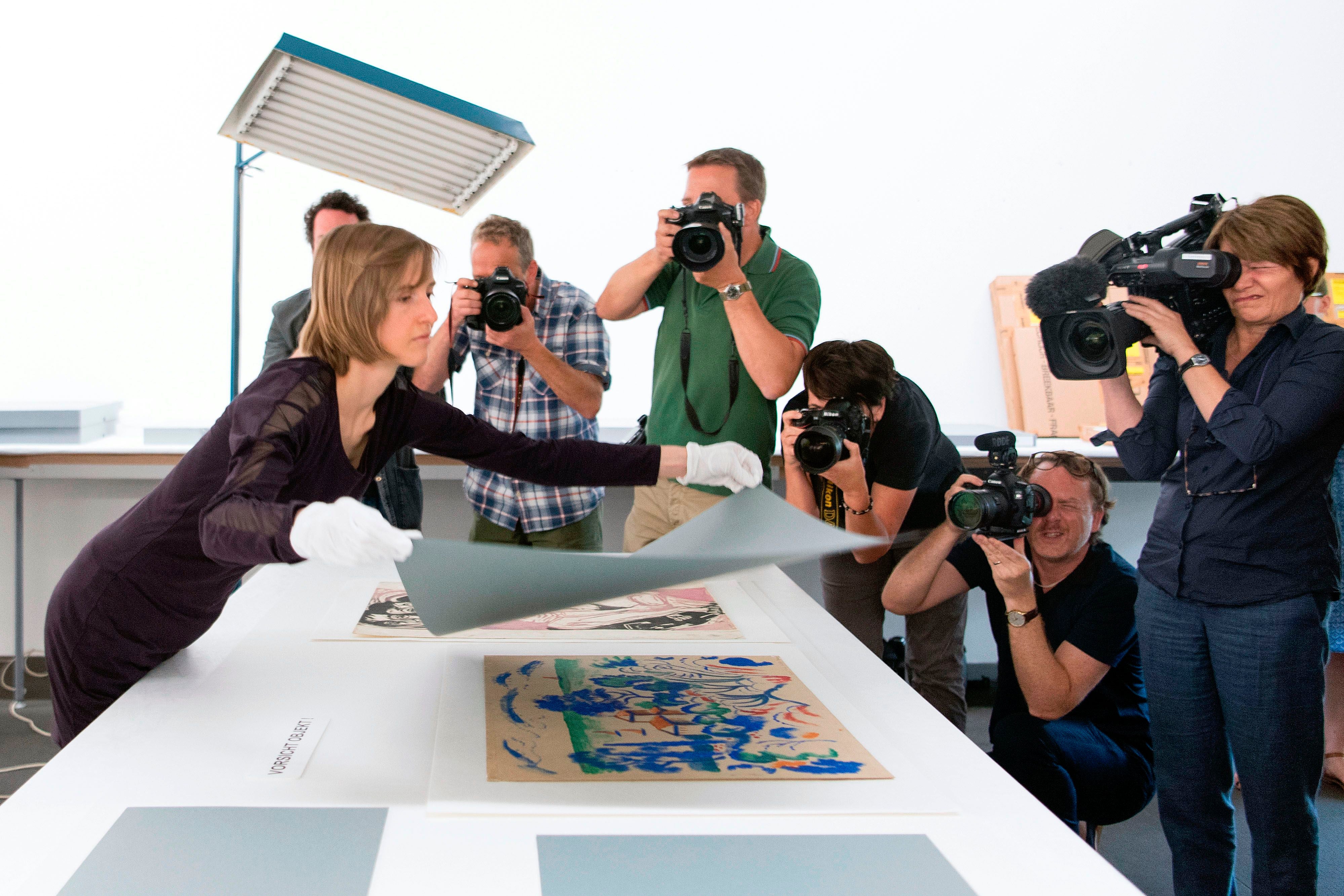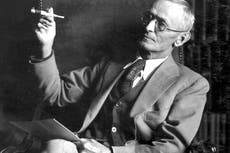Cornelius Gurlitt, the Nazis and a secret collection of masterpieces
The art collector left his magnificent selection of artworks to the Kunstmuseum in his will but who was he and how did he get hold of such a collection, asks William Cook


Here in Bern’s Kunstmuseum, a grand art gallery in Switzerland’s compact capital, an exhibition has just opened devoted to one of the most significant art collections of the 20th century – that of Cornelius Gurlitt. The collection’s greatest hits are its French Impressionists (Degas, Monet, Renoir) and its German Expressionists (Franz Marc, August Macke, Otto Dix), but there are countless other masterworks. From Cézanne to Gaugin, from Dürer to Delacroix, it is truly a treasure trove of modern art.
But it’s not just the quality of his collection that makes Cornelius Gurlitt so significant – it’s the fact that he kept these paintings hidden from the world for half a century. For decades, these artworks were assumed to be lost forever – destroyed or mislaid during the carnage of the Second World War. The story behind their discovery raises important questions about the ethics of art collecting, and sheds a harsh, unforgiving light on the murky business of art dealing during the dark days of the Third Reich.
Our story begins 12 years ago, in September 2010, when Gurlitt, a 77-year-old German citizen, boarded a train in Zurich bound for his hometown, Munich. As his train crossed the border from Switzerland into Germany, the Bavarian police conducted a customs inspection. In Gurlitt’s luggage, they found an envelope containing €9,000 in cash. Suspecting him of tax evasion, they referred him to the public prosecutor.
The authorities soon discovered that Gurlitt was no ordinary citizen. He’d never married. He’d never had a job. He was a virtual recluse. He made regular trips to Switzerland and returned with significant amounts of cash. In February 2012, the police searched Gurlitt’s modest apartment in the sedate Munich suburb of Schwabing. There they found around 1,500 artworks, by many of the most famous artists of the late 19th and early 20th centuries, a hoard worth hundreds of millions of euros.
The German authorities seized these artworks and set about trying to work out where they’d come from. This was no easy task. Gurlitt insisted they were his rightful property, inherited from his father, Hildebrand. Yet far from reassuring them, this revelation set alarm bells ringing. Hildebrand Gurlitt was a German art dealer who’d worked closely with the Nazis. Alongside their crimes against humanity, the Nazis had plundered countless works of art. Were these artworks really Cornelius Gurlitt’s rightful property? Or had his father acquired them illegally during the Third Reich?
The German authorities tried to keep their investigation under wraps, but in November 2013 the news leaked out. The German magazine Focus broke the story: “Der Nazi Schatz” (the Nazi Treasure) ran the headline on the cover, above a mocked-up photo of Hitler alongside one of the many meisterwerken in Gurlitt’s collection. The story instantly became front-page news throughout Germany. The reclusive Gurlitt became a public figure overnight.
Sure, he was buying paintings from collectors who wanted to sell and needed the money but a lot of these sellers were in no position to haggle or walk away from a bad deal
Gurlitt agreed to cooperate with the investigation, and further revelations followed. It transpired he’d been selling artworks to art dealers during his trips to Switzerland. In February 2014, news broke about yet more artworks, in a house he owned in Salzburg. In April, Gurlitt agreed to restore any looted works to their rightful owners – a far more generous commitment than many German museums had made. In May, he died of heart failure, aged 81. In his will, he named Bern’s Kunstmuseum as his sole beneficiary.
Why Gurlitt left his collection to the Kunstmuseum remains a mystery. He had no connection with the gallery, nor any particular link with Bern. There was some speculation that leaving his collection to a foreign gallery was an act of revenge against his native Germany for investigating the provenance of his collection with such rigour. Yet whatever the motive for his bequest, Gurlitt took it to the grave.
Some of Gurlitt’s relatives challenged his will, but the German court upheld it. A subsequent appeal was also rejected. After six months of deliberation, Bern’s Kunstmuseum decided to accept Gurlitt’s bequest. Together with the German authorities, the gallery took on the Herculean task of trying to establish the provenance of these hidden artworks. This would have been an arduous ordeal at the best of times, but the reason it was so complicated was because of the ambiguous and elusive character of the man who’d assembled this vast collection – not Cornelius, but his father, Hildebrand.
Hildebrand Gurlitt was born in Dresden in 1895, into a prosperous family of artists, art historians and art dealers. He fought on the Western Front in the First World War, and then studied art history in Frankfurt and Berlin. As a curator during the late 1920s and early 1930s, he championed avant-garde German artists like Max Pechstein, Erich Heckel and Emil Nolde. After local reactionaries drove him out of his first gallery directorship, in Zwickau, he secured another directorship in Hamburg – but when the Nazis came to power, in 1933, he was fired from that job too, on account of his modernist sympathies (to make matters worse, he was a quarter Jewish).

The Nazis had declared war on modern art, denouncing virtually all modernist artists as “degenerate.” They loathed surrealism and abstraction, but German Expressionism was their particular bête noire. Leading German Expressionist artists like Max Beckmann and Ernst Ludwig Kirchner were banned from public galleries, mocked and stigmatised, and hounded into exile. Beckmann fled the country. Kirchner killed himself.
Liberal curators like Hildebrand Gurlitt were replaced by Nazi (or, at the very least, conservative) curators, who disliked (or at least purported to dislike) modernist aka “degenerate” art. To support these “degenerate” artists in any way was now considered unpatriotic, subversive, Bolshevik. To express any admiration for their artworks made you a marked man.

With no further demand from public galleries, and a lot less demand from private collectors, the prices of “degenerate” artworks dropped dramatically. Barred from his chosen career, deprived of a steady job, Hildebrand Gurlitt set about buying up “degenerate” works of art.
Was Hildebrand a carpetbagger, or a knight in shining armour? Sure, he was buying paintings from collectors who wanted to sell and needed the money, but a lot of these sellers were in no position to haggle or walk away from a bad deal. Some were German Jews, who needed cash to flee the country. Was Hildebrand helping these sellers, or exploiting them? Either way, he ended up buying a lot of “degenerate” art at knockdown rates.
Initially, it might have been possible to give Hildebrand the benefit of the doubt (as a “Mischlung” – a German of partial Jewish descent – you could argue that he was merely trying to save his own skin) but any special pleading became untenable when he was hired by the Nazi government, as one of four art dealers assigned to sell “degenerate” artworks abroad. These works had been seized from public galleries – against the wishes of the progressive curators who’d purchased them – and were now being hawked around to raise foreign currency for the Nazi state (“We even hope to make money from this garbage,” said Goebbels). Only a few years before, Hildebrand had been one of those progressive curators. Now he was a poacher turned gamekeeper, working for the Nazis who’d fired him.
One way or another, quite a lot of this “degenerate” art ended up in Gurlitt’s own collection. Was he double-crossing his Nazi employers? Did he believe he was acting honourably, saving these avant-garde artworks for posterity? It’s hard to say.

What is certain is that when Hitler invaded France, Gurlitt surely crossed the moral Rubicon, even if he hadn’t crossed it already. He was sent to Paris to buy up pictures for the Fuhrermuseum, a grandiose art gallery that Hitler planned to build in his Austrian hometown, Linz. A lot of art was shipped back to Germany; a lot ended up in Gurlitt’s own collection. How he came by these artworks is a riddle the German authorities and the Kunstmuseum have spent the last decade trying to unravel.
By the end of the Second World War, Hildebrand Gurlitt was on the most wanted list of the US Army’s Art Looting Intelligence Unit. Interrogated about his art collection and his conduct during the war, he managed to convince the Monuments Fine Arts & Archive Section (aka the Monuments Men) that he was a blameless victim of Nazi persecution, citing his Jewish blood and the jobs he’d lost before the war.
After the war, cleared of any wrongdoing, Hildebrand resumed his career as an art dealer in West Germany, focusing on modern art. He secured a curatorial role in Düsseldorf, mounting numerous modernist exhibitions before dying in a car crash in 1956, aged 61. It seems the bulk of his collection passed to his wife and then to their son, Cornelius, whereupon it effectively disappeared.
He told the Americans that some of his papers and some of his collection had been lost in the Allied destruction of his hometown, Dresden
Born in 1932, in Hamburg, Cornelius was studying art history at Cologne University when his father died. After he inherited his father’s collection, he retreated into anonymity. Like a modern Midas, he became a prisoner of these precious paintings. In Munich, where he lived for so long, he barely left a trace.
In November 2017, the Kunstmuseum mounted its first Gurlitt exhibition, titled “Degenerate Art – Confiscated and Sold,” in tandem with a parallel exhibition, “Nazi Art Theft and its Consequences,” at the Bundeskunsthalle in Bonn. I attended both exhibitions and was astonished by the variety and vibrancy of the art on display.
I was also reminded of what an emotive subject this was. At the opening of the show in Bonn, Cornelius’s cousin, Ekkeheart Gurlitt, delivered an impassioned speech from the floor, protesting about (among other things) the provocative title of the exhibition. Clearly the “Schwabinger Kunstfund” (Schwabing art trove) was capable of arousing fierce emotions. The ghosts of Hildebrand and Cornelius Gurlitt seemed omnipresent. They felt like the true curators of these twin shows.
The Kunstmuseum’s new show takes the public behind the scenes of the last five years’ research. It’s quite clear that this is a monumental, potentially endless undertaking. Sorting out the provenance of these artworks remains a work in progress, and some aspects of the puzzle may never be resolved.

Hildebrand Gurlitt deceived the Nazis and the Allies. He hid and falsified various records. He told the Americans that some of his papers and some of his collection had been lost in the Allied destruction of his hometown, Dresden. Yet even if none of his papers had been destroyed, it would still be a hard job finding out the complete provenance of each artwork. The Nazis shipped art out of France and back to Germany by the kilo. The paperwork was wilfully slapdash. This was pillage on a colossal scale.
The Bundesrepublik and the Kunstmuseum have been beyond reproach in this painstaking process. The Bundesrepublik’s initial investigation was meticulously thorough; Bern’s Kunstmuseum has taken this process even further. Regarding restitution, they’ve applied the spirit as well as the letter of the law.
Yet the number of works that Gurlitt held illegally appears to be relatively small. In 2015, a Matisse and a Liebermann were reunited with their rightful owners, as was a Pissarro in 2017 and a Signac in 2019. This year, five works of “uncertain provenance” were returned to Germany. Various other works have been returned to private owners, but it seems that most belonged to Gurlitt, and consequently to the Kunstmuseum.

It appears that Hildebrand Gurlitt bought the majority of these works legitimately, and so his son was quite entitled to bequeath them to whoever he chose. Some were bought before Hitler’s reign of terror; some were family heirlooms. Even most of those bought during what Germans refer to as the Hitlerzeit were legally legit. Yet perhaps the legal status is only half the story. For any artwork purchased during the Hitlerzeit, it’s impossible to know the human circumstances, to what extent it was sold under duress.
The exception to this rule is the “degenerate” art that forms such a large part of the collection. Here, the legal position is irrefutable: Hitler was the head of state, the Nazis were the national government, so their decision to strip Germany’s museums of these artworks and sell them abroad was a matter of public policy. These pictures now belong to the Kunstmuseum. There is no prospect of restitution. Legally, it’s black and white.
Yet as you walk around this show, and see these pictures arranged beneath the names of German museums they were taken from, it still feels wrong (to me, at least) that they haven’t returned home. Progressive German curators purchased these pictures for German galleries. Those curators were dismissed, their modernist collections were dismantled, and the curators who replaced them were Nazi stooges. These German galleries were victims of the Nazi regime. Legally, they have no redress, and the Kunstmuseum has done nothing wrong. However, as an act of charity and humanity, I hope that one day they can find it in their hearts to return a few of these pictures from whence they came.
Cornelius was clandestine and disingenuous (why keep his collection such a secret if he was so sure it was kosher?) but ultimately, he merely comes across as an eccentric loner. His father Hildebrand, conversely, supped with the devil, and so this bequest will always feel slightly tainted. Yet for all its moral headaches, this latest Gurlitt show is still a cause for celebration. These beautiful pictures were lost for over half a century. Now they’re back in a public gallery, where everyone can see them, an almanac of Modern Art: Chagall, Picasso, Munch, Kandinsky. The list goes on and on.
And in the end who really cares which country these timeless pictures now reside in? They belong to the entire world, not one nation, and here they are in the heart of Europe.
Taking Stock – Gurlitt in Review is at the Kunstmuseum, Bern (www.kunstmuseumbern.ch) until 15 January 2023. For more information visit www.bern.com or www.myswitzerland.com
Join our commenting forum
Join thought-provoking conversations, follow other Independent readers and see their replies
Comments



Bookmark popover
Removed from bookmarks